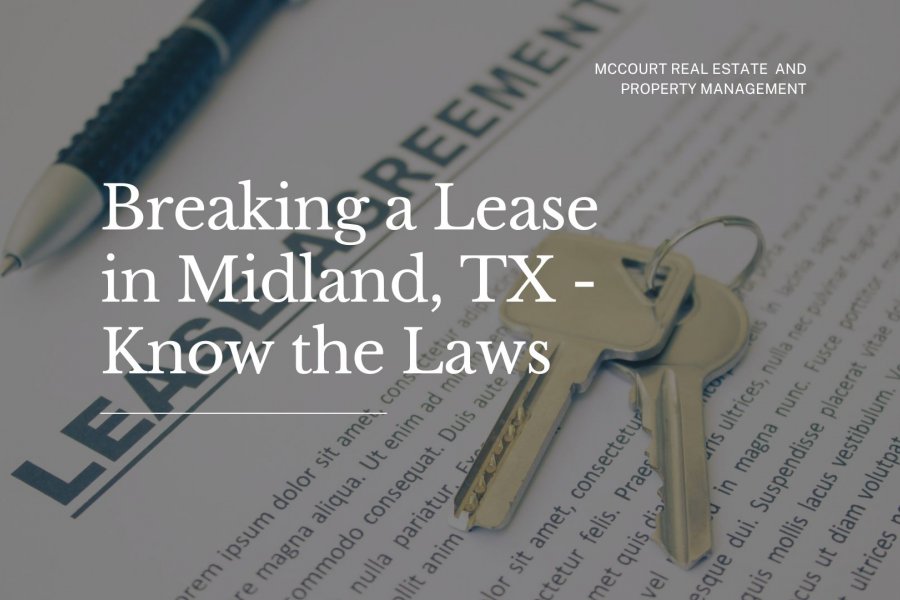
As a Texas landlord, you’re bound by the rules and regulations under Chapter 92 of Texas Property Codes. Among them are those regarding a tenant’s rights and obligations when it comes to breaking the previously agreed upon lease.
In today’s article, we at McCourt Real Estate Property Management will go over everything a landlord would need to know about how and when their tenant could legally and illegally break their lease.
Defining a Lease Agreement in Texas
A lease is a legally binding document between a landlord and a tenant. It lays out the expectations of both the landlord and the tenant so it’s important that the landlord make it as detailed yet concise as possible to avoid confusion and any misunderstandings in the future.
The following are important terms that the lease must include.
- Penalties for breaking the lease unjustifiably, this can include eviction. If tenants break the lease without justification, landlords may need to pursue legal action in court to make the tenant pay for damages or unpaid rent.
- Your tenant’s rights when it comes to breaking the lease. Let them know what scenarios would allow them to break their lease early without penalty.
- The amount of notice tenants must give the landlord in order to end their periodic lease agreement. In Texas, both parties must serve the other a 7-day advance written notice prior to ending a week-to-week notice. To end a month-to-month tenancy, either party must serve the other 30-day advance notice. Tenants on a fixed-term lease in Texas don’t have to provide any advance notice.

- Your responsibility to re-rent the unit. When a landlord fails to make reasonable efforts to re-rent the unit, they may be violating their obligations. Such failure could result in legal challenges or financial penalties related to lost rent.
- Your tenant’s right to sublet the unit. The laws in Texas makes unauthorized subletting illegal. If your tenant wishes to sublet their unit, they must first seek the landlord's approval. As the landlord, you reserve the right to either approve or reject their request.
Unjustified Reasons to Break a Lease in Texas
The following reasons don’t offer enough justification to release a tenant from their contractual lease obligations.
- Breaking a lease agreement to live with someone else.
- Breaking the lease early to move closer to work or home.
- Breaking a lease agreement after a separation or divorce.
- Breaking the lease in Texas to downsize or upsize.
Breaking the lease agreement for any of the aforementioned reasons often attracts heavy financial or legal repercussions for your tenant in Texas. In the absence of legal justification, the best way to break a lease would be to seek for them mutual termination from the landlord.
Justified Reasons to Break a Lease in Texas
Some reasons offer tenants enough legal protection from penalties for breaking their lease early. According to the law, the following are the legally justified reasons for early rental agreement termination.

Active Military Duty
If your tenant is an active service member and has been relocated, they are protected from penalties by the Servicemembers Civil Relief Act (SCRA). The protection begins from the moment they enter active military duty to between 30 and 90 days after getting discharged.
Before terminating their lease agreement though, a tenant must fulfill certain obligations. Including, providing their landlord notice of their intention to leave early due to a deployment or change of station. They must also provide the landlord with a letter from their commanding officer stating their pending deployment.
Once the tenant delivers the landlord written notice, the lease will end 30 days after the next rent cycle as per the SCRA.
Texas law defines a servicemember as one who belongs to the armed forces, activated National Guard, commissioned corps of the Public Health Service, and the commissioned corps of the National Oceanic and Atmospheric Administration.
Habitability Issues in the Unit
If a landlord fails to address habitability issues promptly, Texas tenants may have the legal right to break their lease early without penalty. Failing to provide habitable conditions could result in tenants withholding rent or legally terminating the lease in Texas. Landlords will always want to make sure that repairs are made promptly and that their rental property has:
- Hot and cold running water.
- Windows and doors that are secure.
- Working smoke alarms in all bedrooms.
- Adequate number of trash receptacles.
- A pest-free dwelling.
In addition, the landlord will also want to make repairs and respond to maintenance requests within a reasonable period of time.

Harassment by the Landlord
As a landlord, you also know that respecting the privacy of your tenants is of the utmost importance. Landlords don’t want to barge in unannounced, as that would mean violating their right to peace and quiet. Additionally, landlords must not prevent tenants from paying rent.
Texas landlord-tenant law requires that landlords provide their tenants with notice prior to entering rented premises. While it doesn’t specify the exact amount, a 24-hours’ advance notice often suffices with most tenants.
Case of Domestic Violence
Texas law provides domestic violence victims with certain special provisions for their protection. If your tenant becomes a victim of domestic violence, they may have legal justification to break their lease early.
But before the tenant can do so, the landlord can ask them to provide proof of their status. Landlords may require a copy of a temporary injunction, a protective order, a temporary ex parte order, or an order of emergency protection from the court.
Death of a Tenant
As per Texas law, the death of a tenant is also a legally justified reason for early lease termination. A representative of the dead tenant may terminate the lease early if the tenant was the sole occupant of the unit.
Utility Cutoff
If landlords have agreed to provide tenants with utility services and they are cut off due to failing to pay rent, the tenant can break their lease early. The security deposit can be used to assist with this.
Bottom Line
So, there is everything landlords would need to know when it comes to a tenant breaking their lease early. If are a landlord and have any more questions on this aspect of Texas law, McCourt Real Estate & Property Management can help.
McCourt Real Estate & Property Management is a leading property management company in Midland. Get in touch to learn how we can help you succeed!
Disclaimer: This blog should not be used as a substitute for legal advice from a licensed attorney in your state. Laws change, and this post might not be updated at the time of your reading. Please contact us for any questions you have in regard to this content or any other aspect of your property management needs.